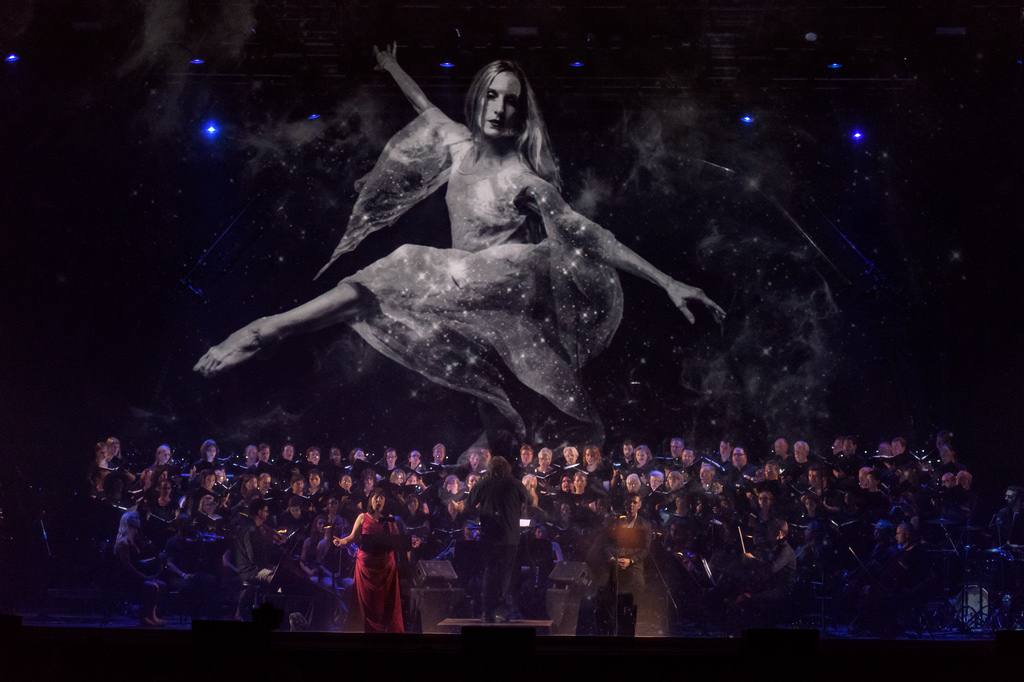“The Hubble Cantata is one of the projects that is sort of leading the way in technology and performance,” says producer Beth Morrison about the show she is producing at the Ford Theatre tonight. “Certainly in the classical arts which are often time behind popular culture.” Beth Morrison heads Beth Morrison Projects and this concert is in partnership with LA Opera.
The Hubble Cantata makes its West Coast Premiere tonight at the Ford Amphitheater. The piece combines live orchestra, opera (sung by Nathan Gunn and Jessica Rivera), two choruses and a five-minute virtual reality film that utilizes images from the telescope for which the piece was named. Paola Prestini composes it with a libretto by Royce Vavrek. The film was made by Eliza McNitt. And if that isn’t enough, the project is narrated by astrophysicist Dr. Mario Livio.
I recently spoke to Beth Morrison, who splits her time between New York, Boston and Los Angeles about this and the challenges of breaking boundaries in the performing arts.

How was The Hubble Cantata originally presented and where?
We premiered in Brooklyn at an outdoor festival. We premiered it for 6,000 people. That’s an extraordinary number to go to a contemporary new classical music piece. In large part that really was because of the allure of the virtual reality component side of the piece. I do think that the piece is provocative to an audience that might not otherwise think they would be interested in classical music work.
You are involved with a diverse group of creators and projects. LA audiences had the chance to see Anatomy Theatre, The Source and Thumbprint. What are you looking for when making a decision to partner on a project?
I would say that for me the fundamental relationship and reason I go into a project is with the composer. That also extends to the librettist and director and music director, but it starts with the composer. What I’m looking for is somebody who has a unique voice, one that doesn’t mean that you can’t hear a lineage, but I find that interesting and fascinating. But there wouldn’t be any other composer who could be confused with that composer’s work. After that I would say that it’s really about looking to contribute to the progression of the form, whatever form that may be.
Creating new work seems counterintuitive to the commercial marketplace. How have you been able to navigate your way through risk-adverse culture?
I think that is something that gets to the heart of who I am. I really believe to be a vibrant arts organization you can’t lead with fear. It doesn’t mean I don’t feel fear. I feel like that coupled with really working with artist-lead vision so that I’m really looking to the artist to respond to where they are leading with us. I try not to put restrictions on the artistic process that will shut them down. I tend to say, ‘what is the thing in your mind you really want to do and really want to write.’
If you look at the work of Stephen Sondheim, whose musicals were more successful decades later as revivals than they were in the original productions, do you think the work you’ve chosen to do falls into that category? That it takes the culture time to catch up to what you’re doing?
Totally. I had this conversation with someone I work with. I think a lot of the work I do is ahead of its time and by the nature of the artists I’m attracted to and the kind of work I’m interested in – that will always be the case. It’s a little bit like John Adams when his Nixon in China premiered it was completely panned. But now in the 21st century it is considered one of the great operas of the 20th century. I do think some of the work we’ve created will hopefully have long lives.
What’s the state of classical music in Los Angeles and the rest of the country?
I would say that classical music is pretty darn good in Los Angeles. The LA Phil is an absolute leader and beacon in the commissioning and producing and presenting new work. There are wonderful new music ensembles like Wild Up and LACO and other real music champions. With LA Opera and our partnership to do a main stage Dorothy Chandler piece that is contemporary, you have two major classical music institutions making a really significant stamp on the industry. The places that I spend time are NY, LA and Boston. All three of those cities are doing quite well. I think it is in the more secondary size cities and certainly in the world where it is quite true that classical music is suffering and in need of reinvention.

At a time when we barely have a sense about our country’s role in the world, what can we glean from the The Hubble Cantata about the bigger question of our place in the universe?
That’s a great question. The best answer I can give is really what we are dealing with right now with our country and the polarization of the United States citizens and the administration and all of the natural disasters, looming war in various places, I would say that those considerations factor into our daily existence and create an enormous amount of stress on everybody. I don’t know anybody who isn’t more stressed than they were a year ago based on what’s happening this year. I do think the The Hubble Cantata allows us to step away from that and consider ourselves in the context of the larger picture, the larger universe, and dealing with questions of humanity’s existence and our place in the cosmos. Those questions will always exist – those are the human questions. The bigger questions that The Hubble Cantata can bring up are essential for us to keep in mind as we do make our way through a very difficult world.














